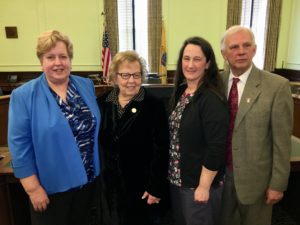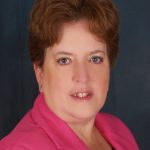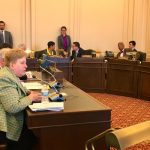Health Care Professionals Call for Paid Sick Days Legislation to Protect Public Health

(L-R) Judith Schmidt, CEO of the New Jersey State Nurses Association; Senate Majority Leader Loretta Weinberg; Beth Cohen, an emergency room nurse and treasurer of HPAE Local 5105 and Bernie Gerard, vice president of HPAE at the press conference on Feb. 26.
TRENTON, N.J.—Feb. 26, 2018— Paid sick days are a public health issue, especially this year, as the flu epidemic continues to spread, said representatives from The New Jersey State Nurses Association (NJSNA), HPAE, the NJ Time to Care Coalition, and others.
“We hear time and time again from patients reporting their symptoms that someone else came into work sick. It’s like school all over again—one parent sends their sick child to school and before you know it more than half the class is sick; it doesn’t get any better as we get older,” said Benjamin Evans, DD, DNP, RN, APN, PHMCNS-BC, NJSNA president. “Staying home when sick—both adults and children—is essential for public health, especially this year when we hear news story after news story about children dying from the flu.”
Union, Hudson and Ocean counties had children die from influenza, and 84 children have perished nationally. More than 63 adults have died from the disease this season. There 17,962 were laboratory-confirmed flu cases reported in New Jersey residents as of Feb 13. Schools are closing because so many employees and pupils are becoming ill.
“This flu season has highlighted the need for earned sick days in New Jersey,” said Senate Majority Leader Loretta Weinberg, sponsor of the paid sick leave bill that will be introduced in the Senate, companion legislation to Assembly bill A-1827. “Workers who are sick and still come into work end up getting others sick, too. When parents can’t take off work to care for sick kids, kids go to school sick, as well. With a guarantee of paid sick days, more sick people would have stayed home, and we may have prevented some of the spread of the flu. This doesn’t just make sense for workers; it makes sense for all of us.”
All too often, the employees who go to work sick are those in lower paying jobs, such as retail and other minimum wage positions, without paid sick days. More than three quarters of Garden State food service and hotel workers do not have a single paid sick day. Child care center and nursing home workers also overwhelmingly lack paid sick days and they are the ones caring for the state’s most vulnerable and medically fragile residents.
“We understand it is challenging to ask businesses to pay for time off for a sick employee and pay someone else to cover their shift, but when you look at the cost benefit analysis, it makes sense,” said Evans. “As a business owner, would you rather have one employee out a day or two with an illness such as the flu and pay a replacement or risk that employee infecting more of your staff and customers with their germs? Having one employee out with sick pay is far less expensive than having multiple employees out for several days.”
When workers are forced to choose between an unpaid sick day and putting food on the table, they will choose feeding their family every time.
Employees come to work sick, sneezing or coughing, they expose coworkers and customers to their germs for hours and spread them by touching doorknobs and light switches. Employer paid sick days would reduce the spread of extremely transmittable viruses such as influenza, norovirus or stomach flu and the common cold while encouraging employees to take care of themselves with well visits to the doctor long before an illness requires a trip to the emergency room.
“Paid sick days will help mitigate the rising costs of health care in this state as less people become ill and more people seek care before their illness becomes an emergency,” said Evans. “It is far less expensive to treat a patient in a doctor’s office or urgent care clinic than in the hospital emergency room.”
“This year is a stark reminder of how quickly a virulent flu season can turn the emergency room into a flu clinic, with many patients simply there because they are unable to take a paid sick day and in need of a doctor’s note,” said Dr. Aakash Shah, an emergency room physician in New Brunswick. “Such visits are costly, inefficient, and risk spreading the flu to patients who are already in critical condition. For such folks, the ability to take a sick day without the worry of losing a job or a day’s pay could not come quickly enough.”
NJSNA, HPAE and NJ Time to Care Coalition urge lawmakers to be stewards of public health and help their constituents by supporting earned paid sick days.
“As healthcare providers are fighting to treat and control the current flu epidemic, we must learn from this experience to stop the spread of the next contagious disease,” said Jean Pierce of HPAE. “Lawmakers must provide workers with paid sick days, so workers are not forced to make a decision to go to work sick or lose a day’s pay. Too many workers have had to work sick, causing the flu to spread throughout the workplace. Trenton legislators can take action to protect all workers and reduce the spread of contagious illnesses at work.”
“It’s too late for this year, but next year lives could be saved with paid sick days,” added Evans. “No employee should have to make the choice between staying home sick or making money to pay their bills, it’s a matter of good public health.”
###
About NJSNA
NJSNA, which was established in 1901, is a constituent member of the American Nurses Association. The New Jersey State Nurses Association (NJSNA) represents the interests of 125,000 registered nurses and advanced practice nurses as an advocate for the nursing profession. NJSNA’s lobbying arm continues to protect the nursing profession through legislative victories. Its nonprofit foundation, Institute for Nursing, helps nurses further their careers by providing continuing education, scholarships and research grants in addition to invaluable networking opportunities. For more information, nurses can visit www.njsna.org or contact NJSNA at njsna@njsna.org or (609) 883-5335.




